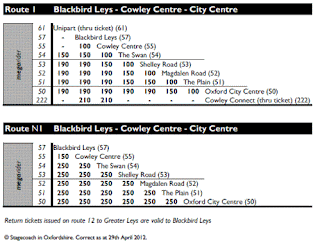Punctuality is important. Passengers prefer buses turning up when they are timetabled. The Traffic Commissioner takes a dim view of poor punctuality and can fine and restrict operations because of poor punctuality. However, it sometimes appears that bus operators regard punctuality as something they are forced to keep to avoid fines etc.
How do operators measure punctuality? One major operator in South Wales has inspectors at bus stations at random times recording the time its services leave. How accurate a picture does this present? Not very, if truth be told. Take, for example, a service that arrives at a bus station 12 minutes late. It then has 10 minutes layover (the time between its scheduled arrival and next departure), picks up a couple of passengers, then leaves 3 minutes late. Buses are classed as being on time if they are up to a minute early or up to 5 minutes late, so this bus would be classed as being on time, even though it was late arriving with the potential for passengers to have missed a connection as a result. Fiddling with stats? Of course.
The problem is, though, that more buses on a route = more expenditure for the operator. PVR (Peak Vehicle Requirement) is a common phrase in the industry which gives the highest number of vehicles a route needs to operate at its busiest time.
Take a service that goes from A to B in 50 minutes, has 10 minutes layover, then takes 50 minutes to get back to A, then has another 10 minutes layover. It takes 2 hours from leaving A to leaving A again. Suppose that service operates every 15 minutes, it would need 8 buses to operate it (4 per hour for 2 hours). Then shave 5 minutes driving time each way from the route and 5 minutes from the overall layover, and instead of a bus needing 2 hours, it then only needs 1 hour 45 minutes. At every 15 minutes, that means needing only 7 buses to operate it, saving a vehicle and fuel, and the expense of a driver - in other words, lower operating costs. This in turn can make help keep fares lower (I'd like to think so in any case). The comprimise may be that some services have such tight schedules to save money that they have trouble remaining punctual and are constantly rushing around to try and keep time.
On the other side of the coin, buses that spend time waiting at stops due to early running, or at stations are not productive. Buses on the road picking up fares are productive. Passengers tend not to like waiting on vehicles that are making up time (when drivers bother that is).
Clearly scheduling is a difficult thing to get right. Giving too much time to a route equals more cost to the operator, resulting in higher fares and less profits, whereas too little time may keep fares down but results in much passenger frustration. For me, the balance should swing towards passenger satisfaction and increased punctuality, but I dare say bus operators look at the other side of the swingometer and profit is the most important thing. Thankfully, the likes of the traffic commissioner, even Wales' newly appointed bus monitors, can punish operators who run services that are not punctual enough.
Fining operators who have punctuality problems hardly addresses the issue, though. Who ultimately pays for the fines? Passengers.......
 In case you didn't know, South East Wales has it's own multi-operator ticket. It's called the Network Rider (or Network Dayrider with Cardiff Bus). Sadly, the mere fact that it doesn't have a universal name gives an indication as to its acceptance and availability.
In case you didn't know, South East Wales has it's own multi-operator ticket. It's called the Network Rider (or Network Dayrider with Cardiff Bus). Sadly, the mere fact that it doesn't have a universal name gives an indication as to its acceptance and availability. In West Yorkshire, there is a MetroDay ticket, costing some £2.50 less than the South Wales equivalent. Not only is it cheaper, but it is universally accepted by all operators in the region (the asterisk merely says tickets for use on special event services). Weekly metrocards are available and, again unlike the Network Rider, monthly, quarterly and annual versions can be bought too.
In West Yorkshire, there is a MetroDay ticket, costing some £2.50 less than the South Wales equivalent. Not only is it cheaper, but it is universally accepted by all operators in the region (the asterisk merely says tickets for use on special event services). Weekly metrocards are available and, again unlike the Network Rider, monthly, quarterly and annual versions can be bought too.



